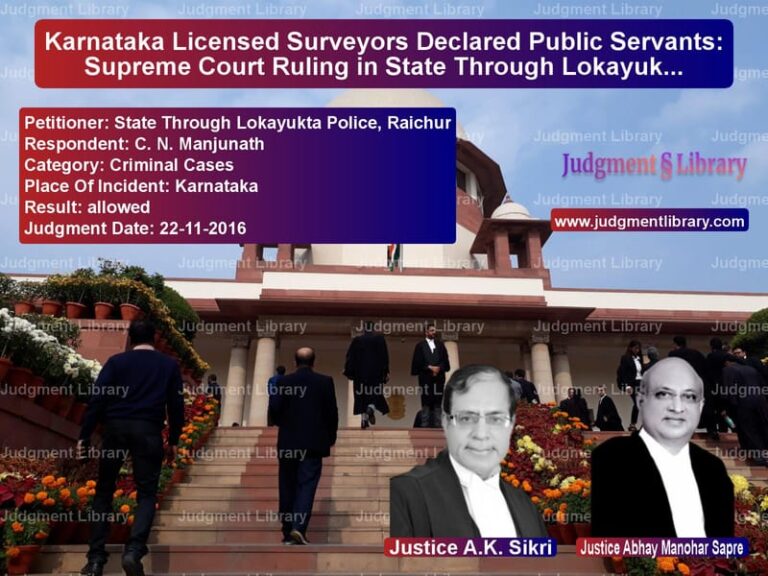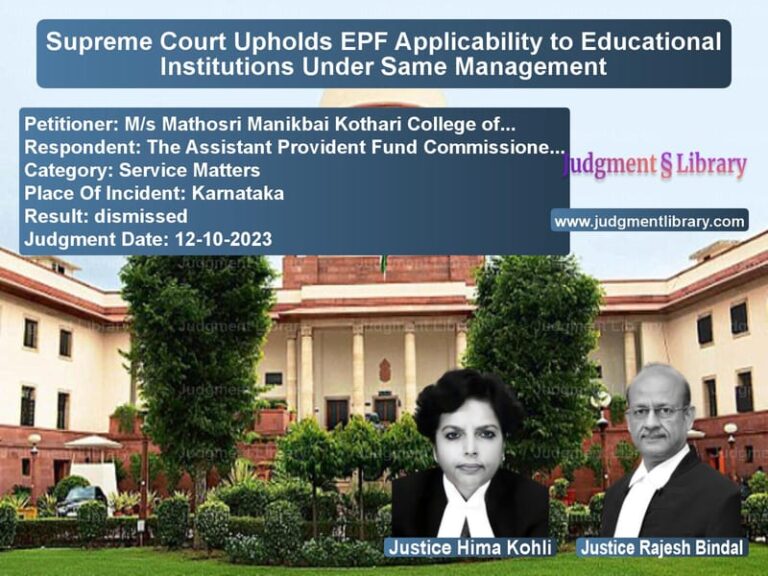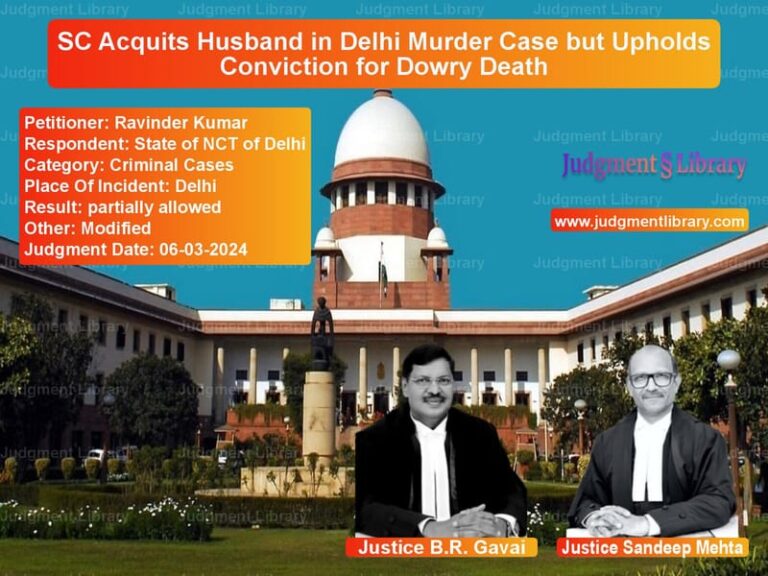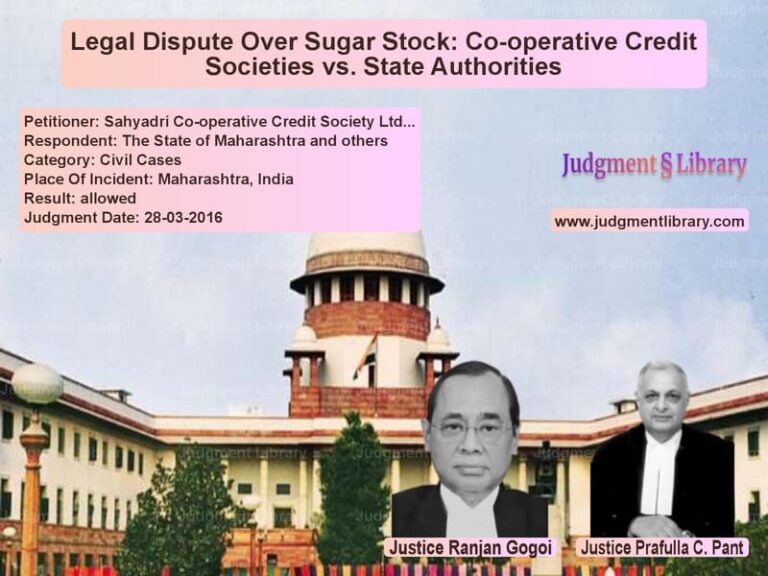Supreme Court Rules on Interest Liability for Entry Tax Payment in Indian Oil Case
The Supreme Court of India, in its judgment dated April 22, 2019, ruled on a significant taxation matter concerning the liability of Indian Oil Corporation Limited (IOCL) to pay interest on Entry Tax under the U.P. Tax on Entry of Goods into Local Areas Act, 2007. The case arose from a demand by the State of Uttar Pradesh for interest on Entry Tax payments, which IOCL challenged. The Supreme Court allowed the appeal, set aside the Allahabad High Court’s judgment, and remitted the matter for reconsideration.
Background of the Case
The case revolved around Entry Tax levied under the U.P. Tax on Entry of Goods into Local Areas Act, 2007. IOCL was required to pay Entry Tax on crude oil, but due to prolonged legal challenges concerning the validity of Entry Tax laws, the company had been depositing tax amounts into a separate interest-bearing account.
The Allahabad High Court had earlier dismissed IOCL’s petition challenging the demand for interest on Entry Tax, stating that the liability was valid. The Supreme Court, however, found that the High Court had erred in its analysis and remitted the case for further examination.
Legal Issues Considered
The Supreme Court examined several legal questions, including:
- Whether the writ petition challenging the interest liability was barred by res judicata.
- Whether the U.P. Entry Tax Act, 2007, contained a substantive provision for charging interest.
- Whether IOCL was liable to pay interest on Entry Tax during periods when the tax itself was under legal scrutiny.
- What relief, if any, IOCL was entitled to in terms of interest liability?
Petitioner’s (IOCL’s) Arguments
- The Allahabad High Court’s earlier judgment did not explicitly decide the issue of interest liability, and therefore, res judicata did not apply.
- The Act of 2007 lacked a substantive provision explicitly mandating the payment of interest on delayed Entry Tax payments.
- Since the legality of the Entry Tax was under dispute, IOCL had deposited the tax amount in a separate interest-bearing account in compliance with court orders.
- The company had acted in good faith and should not be penalized with additional interest liability.
Respondent’s (State of Uttar Pradesh’s) Arguments
- The U.P. Entry Tax Act, 2007, incorporated provisions from the U.P. Value Added Tax Act, 2008, which included provisions for interest on delayed tax payments.
- By retaining the Entry Tax amount without full payment to the state, IOCL had effectively delayed tax remittance and should be liable for interest.
- Allowing IOCL to escape interest liability would set a precedent that encourages delays in tax payments.
Supreme Court’s Key Observations
The Supreme Court made several key observations:
- Res Judicata Does Not Apply: The Court ruled that the earlier High Court judgment did not decide on the issue of interest liability. Therefore, IOCL’s petition was not barred by res judicata.
- Existence of a Substantive Interest Liability: The Court examined the applicability of interest provisions from the U.P. Value Added Tax Act, 2008, and determined that such provisions could be applied to Entry Tax cases.
- Legal Uncertainty Justified IOCL’s Actions: Since the validity of the Entry Tax itself had been contested for years, the Court recognized that IOCL had acted in compliance with interim court orders by depositing tax amounts separately.
- Further Examination Needed: The Court found that the High Court had not sufficiently analyzed IOCL’s specific liability for interest payments, and therefore, the case required further adjudication.
Final Judgment
The Supreme Court ruled:
“The appeals are allowed. The impugned judgment of the High Court dated 22.11.2018 is set aside. The writs are revived before the High Court to be considered and decided on merits.”
The Court directed the Allahabad High Court to conduct a fresh review of IOCL’s interest liability under the U.P. Entry Tax Act, 2007.
Impact of the Judgment
This ruling has significant implications for tax administration in India:
- Clarifies the Scope of Res Judicata: Ensures that new legal arguments can be considered even if related issues have been decided previously.
- Precedent for Interest Liability in Tax Cases: Highlights that tax authorities must establish a clear legal basis before demanding interest on delayed payments.
- Encourages Good Faith Compliance: Recognizes that businesses complying with court orders should not be unfairly penalized.
- Future Consideration of Interest Liability: Requires courts to examine individual taxpayer circumstances before imposing additional financial penalties.
Conclusion
The Supreme Court’s decision in Indian Oil Corporation Limited v. State of Uttar Pradesh & Ors. is a landmark ruling on interest liability for Entry Tax payments. By remitting the case for further consideration, the Court ensured a fair evaluation of IOCL’s position and upheld principles of legal clarity and procedural fairness in taxation matters.
Petitioner Name: Indian Oil Corporation Limited.Respondent Name: State of Uttar Pradesh & Ors..Judgment By: Justice Ashok Bhushan, Justice K.M. Joseph.Place Of Incident: Uttar Pradesh.Judgment Date: 22-04-2019.
Don’t miss out on the full details! Download the complete judgment in PDF format below and gain valuable insights instantly!
Download Judgment: Indian Oil Corporati vs State of Uttar Prade Supreme Court of India Judgment Dated 22-04-2019.pdf
Direct Downlaod Judgment: Direct downlaod this Judgment
See all petitions in Income Tax Disputes
See all petitions in Tax Refund Disputes
See all petitions in Banking Regulations
See all petitions in Judgment by Ashok Bhushan
See all petitions in Judgment by K.M. Joseph
See all petitions in allowed
See all petitions in Remanded
See all petitions in supreme court of India judgments April 2019
See all petitions in 2019 judgments
See all posts in Taxation and Financial Cases Category
See all allowed petitions in Taxation and Financial Cases Category
See all Dismissed petitions in Taxation and Financial Cases Category
See all partially allowed petitions in Taxation and Financial Cases Category







